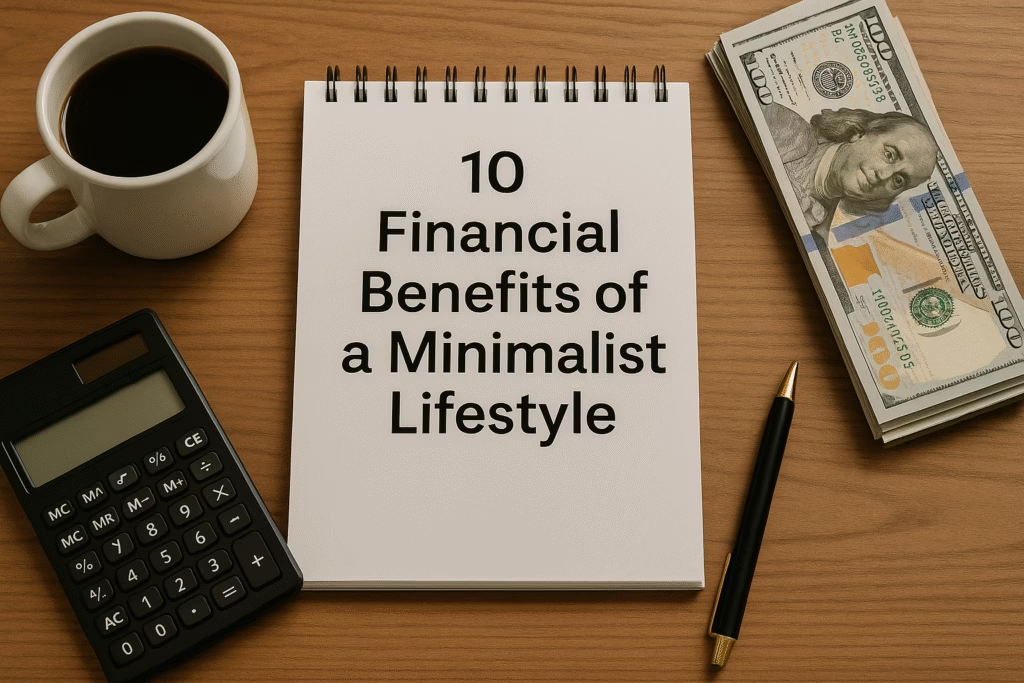Adopting a minimalist lifestyle goes beyond decluttering your home. Financial Benefits. It’s a mindset shift that can bring tremendous clarity to your life—and your wallet. While many are drawn to minimalism for its simplicity and peace of mind, one of its most powerful side effects is the financial freedom it fosters.
In this article, we’ll dive into 10 compelling financial benefits of living minimally and how each one contributes to a healthier, more intentional financial life.
1. You Buy Less, So You Spend Less
Minimalism teaches you to distinguish between wants and needs. Instead of shopping for pleasure, status, or trends, you learn to buy only what serves a genuine purpose in your life.
This leads to:
-
Fewer impulse purchases
-
More thoughtful shopping habits
-
Less buyer’s remorse
The result? A lower monthly spending average and more money in your account.
2. You Avoid Debt (or Pay It Off Faster)
By cutting out unnecessary expenses, you can redirect funds toward paying off debt. Minimalists often prioritize living debt-free because it aligns with their goal of freedom and simplicity.
Whether it’s:
-
Student loans
-
Credit card debt
-
Car payments
The extra cash saved from a minimalist lifestyle can be used to eliminate these financial burdens much faster.
3. Reduced Housing Costs
Many minimalists choose to live in smaller, more affordable spaces. Why pay for extra rooms you don’t use or space just to store stuff?
Benefits include:
-
Lower rent or mortgage payments
-
Cheaper utility bills
-
Less furniture and décor to buy
Living smaller often means living smarter when it comes to finances.
4. Lower Maintenance and Replacement Costs
When you own less, you take better care of what you have. Minimalists often invest in quality items that last longer, reducing the need for constant replacements.
This applies to:
-
Electronics
-
Clothing
-
Furniture
-
Appliances
Quality over quantity leads to long-term savings.
5. Fewer Subscriptions and Services
One major area where people overspend is through automatic subscriptions—many of which they don’t use regularly.
Minimalists audit their digital lives too, often cutting:
-
Streaming platforms
-
Unused app subscriptions
-
Gym memberships
-
Software tools they rarely open
This cleanup of recurring costs can save hundreds annually.
6. Simpler Wardrobe, Bigger Savings
Capsule wardrobes and minimalist fashion choices are not only stylish—they’re cost-effective.
Instead of chasing trends, minimalists:
-
Stick to versatile, timeless pieces
-
Avoid fast fashion
-
Shop less frequently
This drastically reduces spending on clothes without sacrificing personal style.
7. You Save More by Default
Minimalism naturally leads to higher saving rates. When you’re no longer spending on things you don’t need, you end up with more disposable income.
Many minimalists create:
-
Emergency funds
-
Retirement accounts
-
Investment portfolios
Because their cost of living is lower, saving becomes a consistent habit rather than a stressful task.
8. Better Travel for Less
Minimalist travelers focus on experiences over luxury. They pack lighter, plan smarter, and skip the extras that rack up vacation costs.
This approach reduces:
-
Baggage fees
-
Overspending on souvenirs
-
Hotel and dining expenses
By traveling with intention, minimalists enjoy more meaningful (and affordable) adventures.
9. Reduced Insurance Costs
When you own fewer valuables, you don’t need as much insurance. This applies to:
-
Renter’s or homeowner’s insurance
-
Car insurance (if you drive a simpler vehicle)
-
Personal property coverage
In addition, fewer gadgets and high-priced items mean lower risk and lower premiums.
10. Peace of Mind Is Priceless
Though this isn’t a direct dollar amount, the mental and emotional clarity gained through financial minimalism can’t be overlooked.
Less stress over bills, debt, and clutter means:
-
Better decision-making
-
Improved focus
-
A healthier relationship with money
This mental freedom enables you to pursue passions, hobbies, and personal goals that are often delayed due to financial stress.
Final Thoughts: Live With Less, Gain So Much More
Minimalism is not about sacrifice—it’s about choosing better over more. The financial benefits are not only immediate but also long-lasting. Whether you want to build wealth, pay off debt, or simply stop feeling controlled by your finances, minimalism offers a clear, actionable path forward.
Start with one small step: cancel an unused subscription, donate excess clothes, or skip your next impulse buy. Over time, these small decisions snowball into a financially empowered and intentionally lived life.
Did you like it? Read more news like this.
Share it with your friends.






